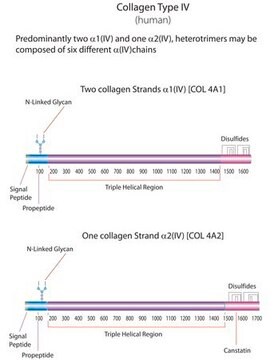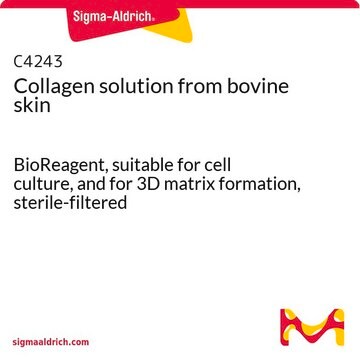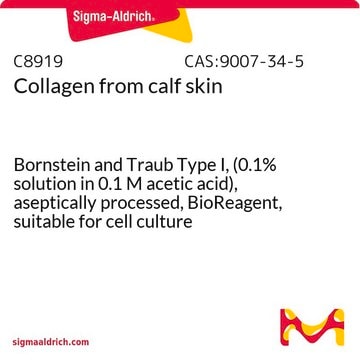C0543
Rat Collagen Type IV
from Engelbreth-Holm-Swarm murine sarcoma basement membrane, lyophilized powder, suitable for cell culture, used for 3D hydrogel formation
Synonym(s):
Type IV collagen, EHS-collagen
About This Item
Recommended Products
product name
Collagen from Engelbreth-Holm-Swarm murine sarcoma basement membrane, Type IV (Miller), lyophilized powder, BioReagent, suitable for cell culture
biological source
mouse (Engelbreth-Holm-Swarm murine sarcoma basement membrane)
Quality Level
type
Type IV (Miller)
product line
BioReagent
form
lyophilized powder
packaging
glass bottle of 1 vial
technique(s)
cell culture | mammalian: suitable
surface coverage
6‑10 μg/cm2
solubility
0.25% acetic acid: 0.5-2.0 mg/mL (Keep at 2-8 °C for several hours, occasionally swirling.)
shipped in
dry ice
storage temp.
−20°C
Gene Information
mouse ... Col4a1(12826) , Col4a2(12827) , Col4a3(12828) , Col4a5(12830) , Col4a6(94216)
Related Categories
General description
Application
- in adhesion assays.
- in hydrogel fabrication.
- to coat cell culture plates for cell differentiation.
- to treat round plastic coverslips for scanning electron microscopy (SEM) analysis in an interaction study between A. culbertsoni trophozoites and Schwann cells.
Biochem/physiol Actions
Other Notes
Quantity
Preparation Note
Pepsin is not used in the preparation.
Storage Class Code
11 - Combustible Solids
WGK
WGK 1
Flash Point(F)
Not applicable
Flash Point(C)
Not applicable
Personal Protective Equipment
Certificates of Analysis (COA)
Search for Certificates of Analysis (COA) by entering the products Lot/Batch Number. Lot and Batch Numbers can be found on a product’s label following the words ‘Lot’ or ‘Batch’.
Already Own This Product?
Find documentation for the products that you have recently purchased in the Document Library.
Customers Also Viewed
Articles
3D cell culture overview. Learn about 2D vs 3D cell culture, advantages of 3D cell culture, and techniques available to develop 3D cell models
3D cell culture overview. Learn about 2D vs 3D cell culture, advantages of 3D cell culture, and techniques available to develop 3D cell models
3D cell culture overview. Learn about 2D vs 3D cell culture, advantages of 3D cell culture, and techniques available to develop 3D cell models
3D cell culture overview. Learn about 2D vs 3D cell culture, advantages of 3D cell culture, and techniques available to develop 3D cell models
Our team of scientists has experience in all areas of research including Life Science, Material Science, Chemical Synthesis, Chromatography, Analytical and many others.
Contact Technical Service









